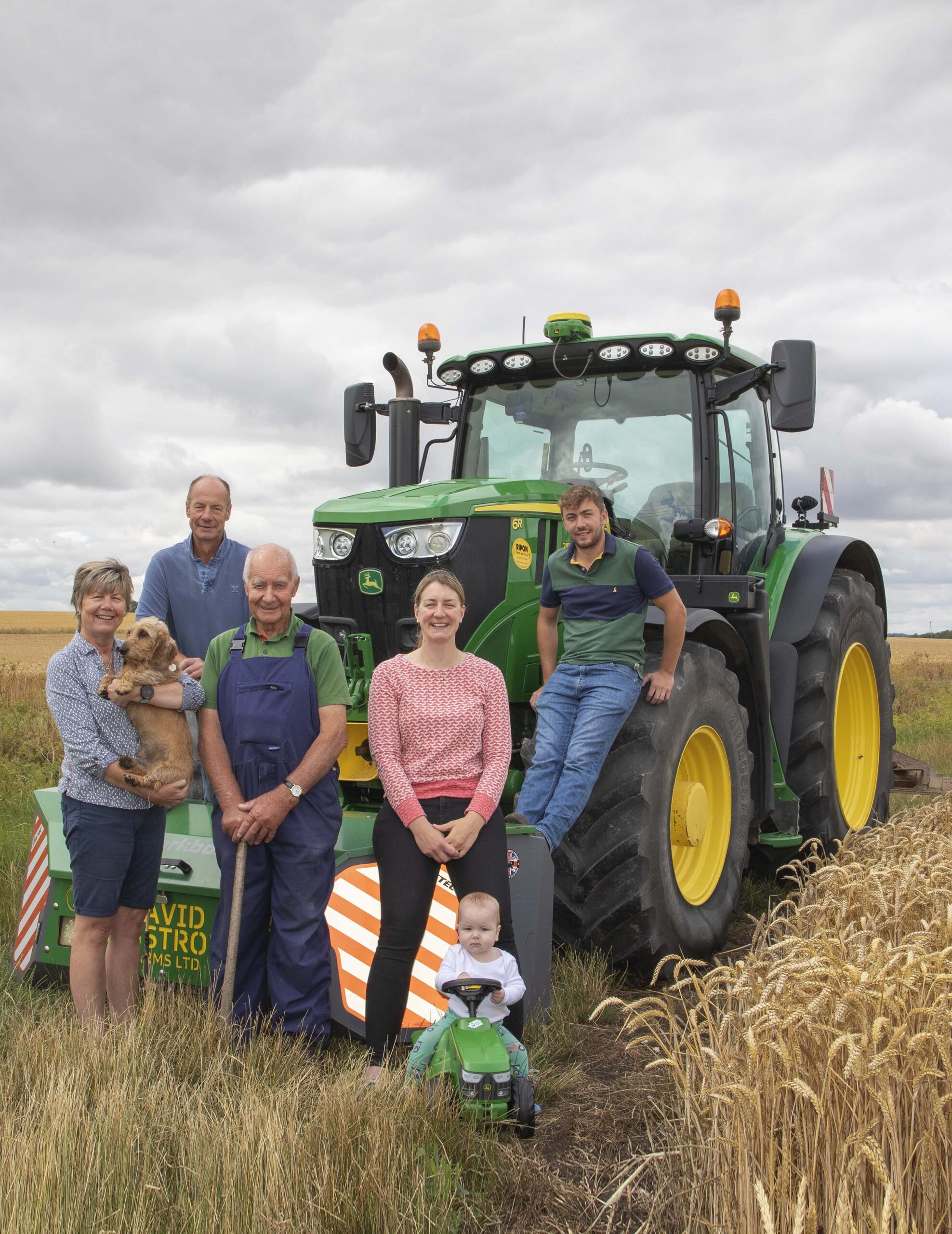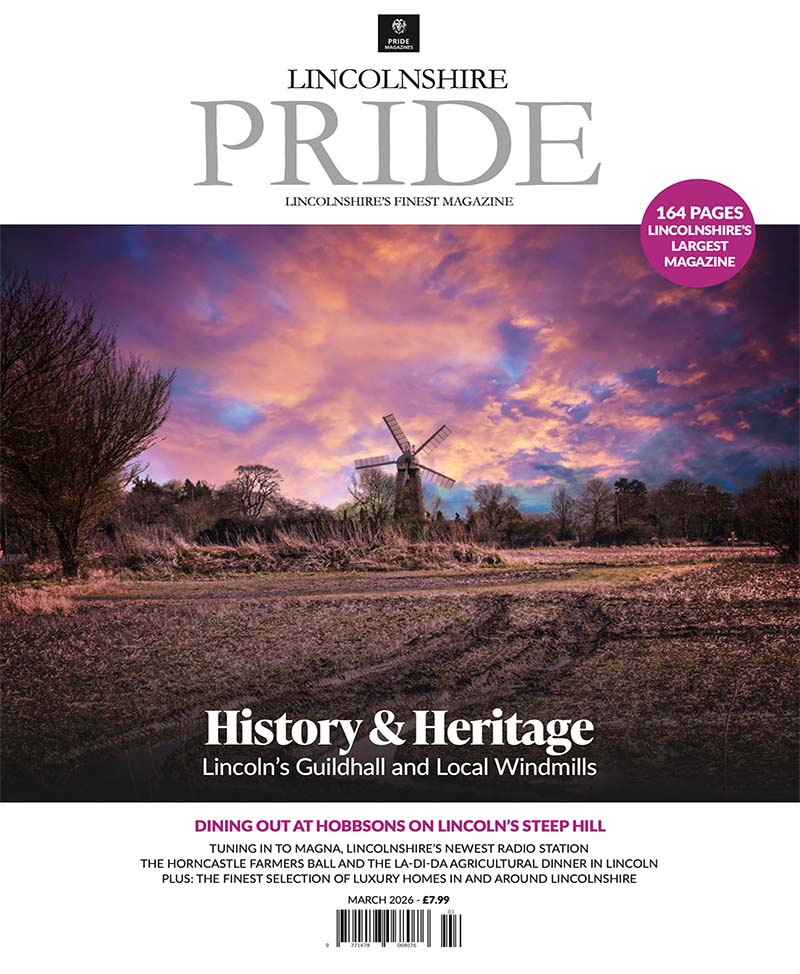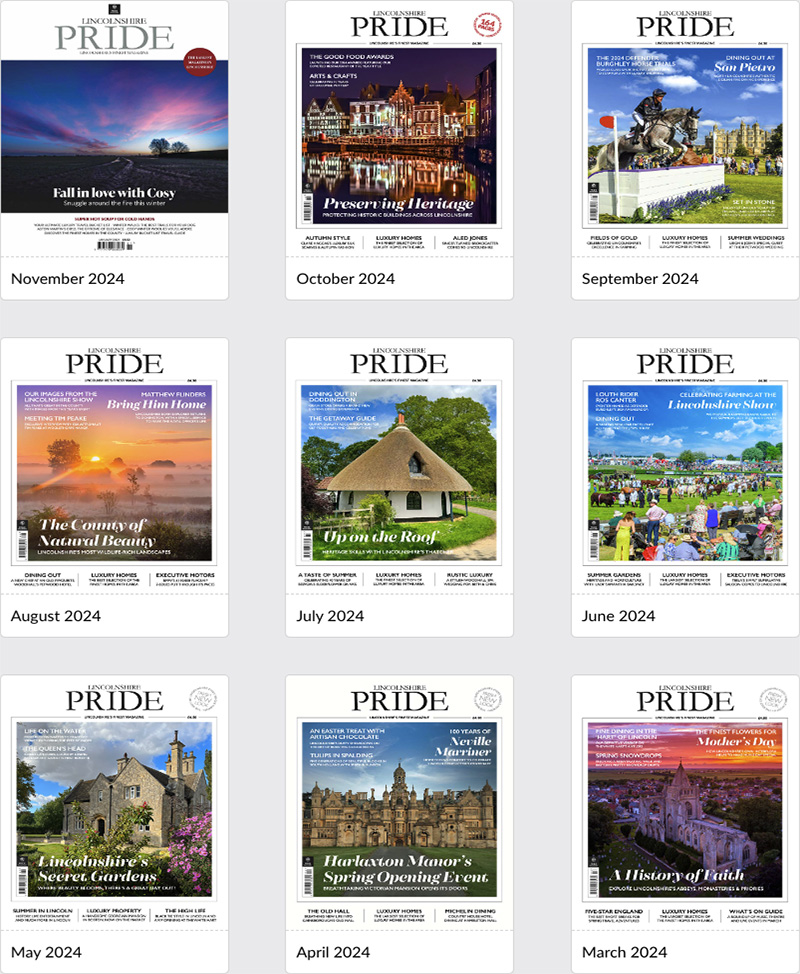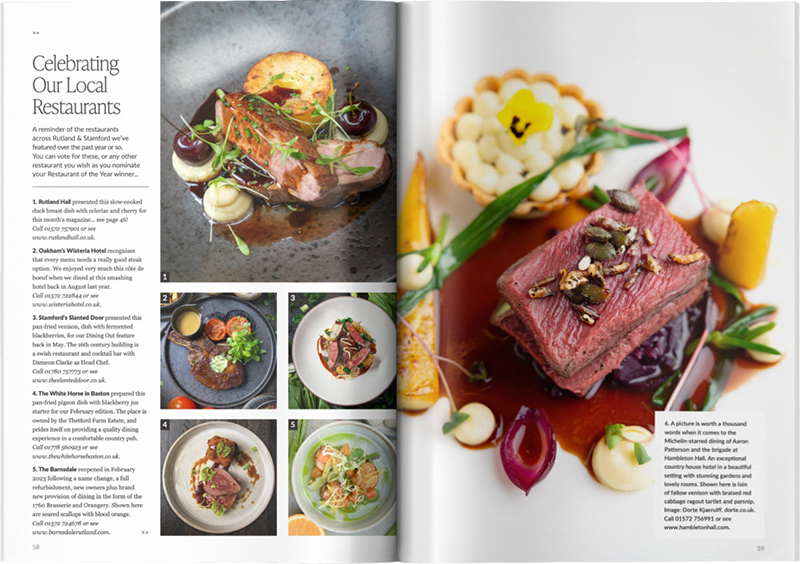
Families in Farming
This month we’re meeting some Lincolnshire families who have dedicated their lives to the custodianship of the countryside, and we’re meeting the next generation of farmers keen to preserve Lincolnshire’s reputation as the county that feeds the country…
Across Britain, agriculture utilises 17m hectares or 69% of the UK’s total land area. There are 102,000 farms, of which 41,506 farms are arable/horticultural, and 52,000 are for livestock or grazing.
There are 3,431 farms in Lincolnshire, collectively 492,046 hectares in size. And of those, 2,348 farms are arable/horticultural, whilst 826 are livestock or dairy farms (257 are mixed/unclassified). Growing cereals takes up nearly 270,000 hectares of land in Lincolnshire and the county has a population of nearly 71,000 heads of cattle, 103,000 pigs and over 135,000 sheep, plus 15m chickens, ducks, geese and turkeys… not to mention an agricultural workforce of 12,000!
Lincolnshire’s produces 11% of the country’s crops and livestock, valued at £2bn, including 30% of the country’s vegetables, 20% of the country’s sugar beet and over 10% of the country’s wheat. As a county, Lincolnshire grows, processes and transports 30% of the nation’s food, £13.6bn worth, supporting 75,000 jobs in agriculture and allied sectors.
It’s easy to be proud of Lincolnshire’s contribution, but a little more tricky to put our hand on our hearts and say we’d be happy for our children to pursue a career in farming.
After all, the work is hard – even you’re assisted by the latest technology and machinery – the hours are long and even good judgement and expertise can be undermined by events in an international supply chain or a run of bad weather.
On paper, farming is a difficult sell to youngsters, but for those who dedicate their lives to a career in arable farming or working with livestock, it goes beyond a job, a career, or even a vocation: it’s a way of life.
This month, we’re meeting three families in farming who are contributing to preserving rural Britain, protecting the countryside and securing our domestic supply of food, we hope to prove that despite all of its aridity and disenchantment farming is also as perennial as the grass.
Generations of Farming in Bardney
For three generations now, the Armstrong family have been keen custodians of their land near Bardney. What’s changed in that time and could they still put hand on heart and recommend that little Archie – aged just eight months old and on his little John Deere – devote his life to becoming the fourth-generation of farmer?
Archie is on his little John Deere, complete with its squeaky horn and lift-up bonnet. It’s very much in keeping with the rest of the kit used in the fields surrounding Abbey Farm near Bardney. Just eight months old, he arrived on the very day that his mum, Kate, was due to talk about the rally held by farmers in Westminster back in November concerning the Labour party’s inheritance tax changes for farmers.
Back in 1957 Bob Armstrong, now 92, left Stirling for a new life in Bardney, with wife Margaret, where their four children would eventually grow up. Also on the train – although hopefully not in the same carriage – were Bob’s 22 dairy cows, who arrived in Lincolnshire just a couple of miles from the farm.
By the time Bardney Station closed in 1970, Bob was running a successful farming operation, and his sons, David and Jim, were enjoying growing up on a family farm, with all the joys that such a life can bring. “We did everything with horses back then, although we did have a little grey Massey tractor, but with metal wheels, not tyres. You’d never drive it on the roads!”
What does Bob think now, with monster combines and enormous tractors? Impressive, he reckons. Nowadays one man and a decent-sized machine can do the job of a dozen men or more. Although he does miss seeing lots of people busy on the farm at harvest time.
Speaking of harvest time, we turned up when rain stopped Bob’s grandson, David’s son Ross, from getting back on their Claas Lexion combine and getting stuck into about 700 acres of cereals harvest… which with modern kit constitutes about a week of work, should the weather be a little kinder to them.
The machinery may have become a lot larger, the cows have now left the farm in favour of the family pursuing a purely arable operation, but those aren’t the only changes across the generations.
The third generation of the family, Ross and his sister Kate (Archie’s mum), started The Spud Barn in the spring of 2020, with Covid ensuring a healthy contingent of customers keen to purchase potatoes from the farm gate. The idea of the new business was to sell some of the family’s potatoes directly to the public, putting them back in touch with their food.
Today they’re delivering several tonnes of potatoes a week in 10kg bags to customers’ homes, around a 15 mile radius, as well as selling them at the farm gate. The family’s potatoes are better than any spuds they’ve had before, say many of their customers, and they’re available from September right up until summer the following year. In addition to selling their potatoes at the farm gate though, another customer of the farm is Branston Potatoes which handles around 350,000 tonnes of potatoes a year – about a trillion potatoes.
However, as David acknowledges, so many things can impact the fortunes of a farmer, despite their good judgement and expertise; the Ukraine and Russia conflict (which has had an impact on fertiliser prices and international grain prices) or more obviously, the weather.
And of course, the current government’s determination to push ahead with its policies of inheritance tax is continuing to put the family’s plans for succession in jeopardy. It’s meant they’re reluctant to make any investments in the farm, like new machinery or additional land, for fear that they could need to raise a six figure sum for the Chancellor – in addition to the corporation tax they already pay – from a business whose value is not realised in free capital, but in land and machinery, without which the business can’t generate revenue.
“It’s a joy to live in the countryside, and to experience the environment just as it’s meant to be, with the changing of the seasons. We love the idea of feeding the nation. The idea of farmers being paid to grow wild flower and SFI crops instead is much less appealing than producing really good quality, high yielding British crops.”
“A much as farming is a pleasure, it’s also really hard work and it can make you feel isolated with so few people working on farms today.
As a profession it’s a bit like playing tennis. If you’ve had poor weather or a particular crop isn’t yielding well, you’ve different crops in the ground so it’s like playing different games or sets. There’s always hope somewhere across the farm.”
The ultimate question, then is as follows. If, in a few years, Archie says he wants to be a farmer when he grows up, will the family be keen to encourage him to make his living from the land?
“I was always keen for Kate and Ross to get a good education, and I love having my family around me,” says David. “I wouldn’t push him into farming, but to see him one day taking on the farm and becoming the fifth generation of the family farming the land would be wonderful!”
The Armstrong Family have been farming are Bardney since 1957, and as well as combinable crops, they sell their Melody and Maris Piper potatoes from the farm gate with delivery in a 15 mile radius, call 07580 849759 or see www.thespudbarn.co.uk.
Growing Flowers near Lincoln
Meet Rhoddy and Penny Whitbread and their daughter Harriet, founders of the Lincolnshire Flower Company, who grow their beautiful blooms on an acre of land on the Aubourn Estate near Lincoln
We all love flowers, whether in borders, planters and pots all around our garden, or cut flowers in a vase on the table. The UK floristry industry is worth around £1.4bn, and until the 1950s, most of the flowers we admired on our kitchen tables were grown in Britain, many in the fertile soils of South Holland, which enjoys a long association with tulips and daffodils.
Sadly, things have changed. Today, over 86% of the cut flowers that UK consumers purchase are imported, supermarkets are responsible for 56% of all cut flowers sold – twice the volume of independent florists, who sell just 23% (the remaining retailers are garden centres and nurseries). 41% of cut flowers sold are purchased as mixed bouquets, whilst roses account for another 15% of purchases; lilies for 9%, chrysanthemums for 8%; carnations for 7%.
The result is that choosing to pick up a bunch of cheerful cut flowers during our weekly supermarket shop means supporting international growers, and encouraging imports… which is not at all sustainable.
Happily, over 1,000 UK-wide independent flower farmers are keen to provide consumers with an alternative. Among them, The Lincolnshire Flower Company which was founded in 2020 by Harriet Whitbread and her parents Rhoddy & Penny.
In 2021 the family outgrew their garden in Hough on the Hill and were able to secure an acre of land on the 2,500-acre Aubourn Hall Estate near Lincoln, set in 12 acres of formal gardens adjacent to the estate’s C17th manor house. The company is affiliated with Flowers from the Farm which aims to support local independent growers like The Lincolnshire Flower Company.
Harriet is a really talented florist, and over half of the flowers the family grows are utilised in arrangements for weddings and other occasions. However, the family also provides the opportunity to purchase cut flowers and arrangements, from the farm gate or with local delivery available. In addition, Harriet can create beautiful arrangements with gift bouquets from around £40, flower subscriptions and gift vouchers are also available. That’s not all, though.
On Saturdays and Sundays in August and September, from 10am-noon you can visit The Lincolnshire Flower Company and pick your own flowers, enjoying the sight and scent of the vibrant blooms to create DIY arrangements, with jam jars of flowers (popular with children) for £8, zinc buckets of flowers for £33 and larger buckets of cut flowers for £55.
The family’s flowers are mostly grown from seeds in the company’s polytunnel which extends to more than 6oft, and those blooms are kept in the very best condition thanks to organic material dug into the soil, relying on organic nutrients rather than chemical-based aids. Among the flowers grown by the family are cosmos, ranunculus, dahlias, delphiniums, chrysanthemums, poppies, phlox and roses including several David Austin varieties.
Stuck for how to arrange your flowers with flair? That’s not a problem either. Harriet provides one-to-one floristry tuition, workshops, and towards the festive season Christmas wreath workshops too.
“We’re also really popular with brides seeking a timeless look for their wedding flowers. Our style is romantic, natural and quintessentially British; wonderful pieces of floral design that are unique to your day. Every bride is an individual, and we believe that our designs should reflect that, and they should use the most beautiful seasonal flowers nurtured right here in Lincolnshire!”
“We choose new things to grow each year and we love being led by the changing seasons. We cherish what is available now and let the flowers inspire our designs… we live in the moment!” says Harriet.
07786 567 202, www.thelincolnshireflowercompany.co.uk.
The Happiest Kids in Lincolnshire
Meet the Trofer-Cook family, starring Farmer Joe, aged 13, eight year-old Stan and seven year-old Ernie, with a supporting cast of mum Clare and dad Adam, as well as their animals: 40 Jacobs, 20 Rylands, three Angus cows, 20 chickens, a couple of dogs and a cat or two… life’s never dull for the happiest kids in Lincolnshire!
Kids… you can never get them up in the morning, right? And you can never get them off their video games or away from their phones, right? We think Clare and Adam Trofer-Cook are probably missing a trick not offering some kind of parenting boot camp for other kids, because their three sons are up at six o’clock each morning (even at the weekend!). And what’s more, video games and social media are way down the list of priorities for ‘Farmer Joe,’ aged 13, and his brothers Ernie and Stan.
Back in lockdown, Joe became fascinated with farming and desperately wanted his own sheep. Planting seeds and growing veg to sell from the front garden of the family’s home in Billinghay, he worked hard enough to finally purchase three Jacobs, and within a couple of months, invested in a couple of chickens to sell eggs at the garden gate too.
Today, Joe’s livestock comprises 40 Jacob and 20 Ryeland sheep, three Angus cows, and about 20 chickens… that’s in addition to a couple of dogs and two cats. Joe’s brothers, Ernie and Stan, have also caught the livestock bug and a year ago, the family moved out of their existing property to take on a smallholding for the boys’ animals.
At six o’clock every morning, the boys are up making sure their animals are fed and watered, with clean bedding. Afterwards, it’s back inside for a scrub behind the ears, breakfast and then off to school.
The evening routine is similar… and show season is just drawing to a close too. The boys have exhibited their sheep at about a dozen country shows including Lincolnshire, Rutland and the Great Yorkshire Show. The dresser in the kitchen is covered in rosettes, with ribbons spilling down into trophies and cups. Mum and dad are understandably proud, but also determined that the spoils and the struggles alike are for the boys to experience. From the outset they’ve refused to spare them from either the financial or emotional challenges of keeping livestock.
“Joe has always had to make his own way financially to support his animals. He needs a tractor, and his tractor fund was looking healthy, until one of the cows, Petunia, became ill. Joe had to sell three of his Jacobs to cover the £900 vet bill. As a parent you’d love to give them just the nicer experiences of keeping livestock, but it wouldn’t be right. They’ve got to see the good and the bad alike. He’s lost animals that he’s helped to lamb or calve, bringing them into the world and being with them when they’re put to sleep. It never gets any easier but he’s become really mature and understands the reality.”
Clare says Joe doesn’t get on well with mainstream education, but upon our arrival, with Clare speaking to somebody who’s arrived to purchase some of the family’s chickens, he confidently walks up to me and gives me a firm handshake. He’s calm, mature and articulate well beyond his age. All three boys are lively, but brilliantly behaved with lovely personalities and bags of enthusiasm for their rural life and for their animals. Joe operates machinery and drives around the family’s smallholding – carefully and confidently, under his parents’ supervision – and he’s never afraid or reluctant to undertake the hard work that keeping livestock necessitates.
Talking to him about anything from the best feed mixes to breed standards and getting a few tips on how to present a Jacob in the show ring, Joe is well-spoken, clearly an expert and calmly confident, even on live camera, hence the reason that he’s appeared on a number of TV shows already, from the BBC’s Countryfile to Channel Five’s Milkshake. The family produce a calendar each year and will soon offer rural AirBNB breaks in their old house where visitors can meet and greet Farmer Joe, who already has five and a half thousand followers on social media and is supported by Scotts Trailers who provided Joe with a trailer for taking his livestock to shows.
All three of the boys enjoy a great relationship with each other, they’re lively, happy and clearly love the responsibility of their animals. If we were Clare and Adam, we’d be very proud, and we look forward to following the future careers of Joe and his brothers!
Follow Joe’s Garden Patch (Farmer Joe) on Facebook.






